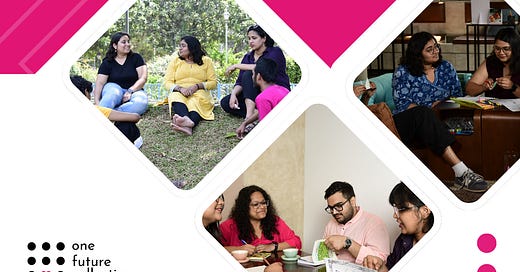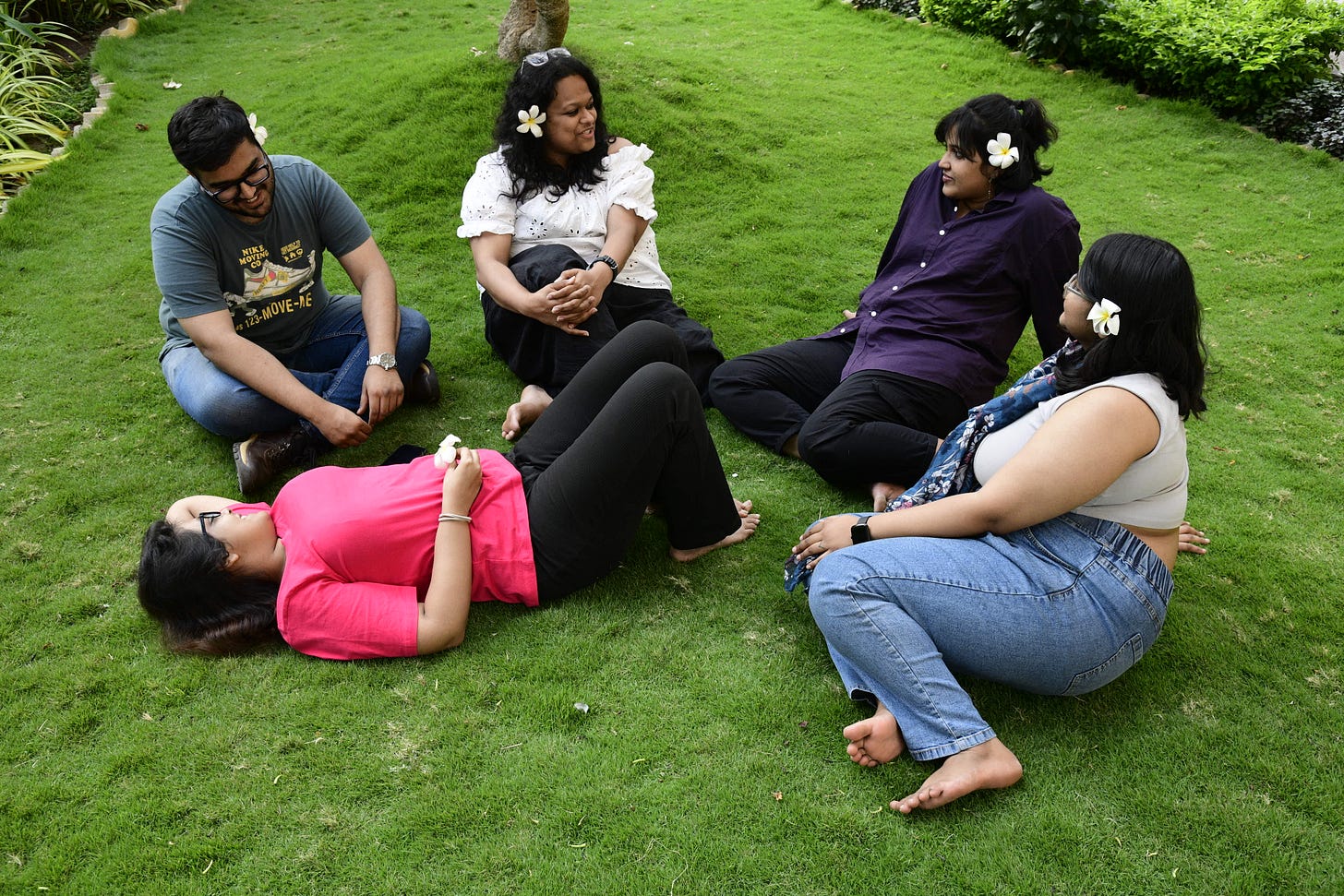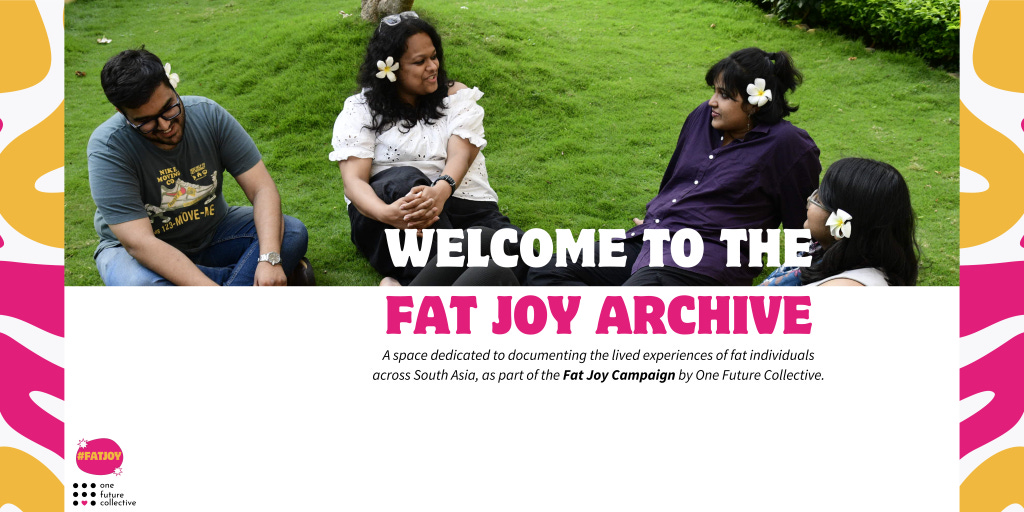One Future Post #15: Read our Fatness in Urban India Research Study! 🌸
In this special edition of the One Future Post, learn more about our ongoing #FatJoy Campaign and get exclusive first access to our research study: Fatness in Urban India!
What You Will Find In This Edition
A Note from the CEO 💌
Key Story: Fatness in Urban India Study Launch ✍🏽
Explore the Fat Joy Campaign 💡
Hello from the CEO 💌
Researcher’s Note
What does it mean to live as a fat person in urban India? How do everyday spaces like offices, public transport, and medical clinics accommodate or exclude fat bodies?
As a fat person, these are questions I have often grappled with. The need for this research emerged from both personal reflections and the professional experiences of our team at One Future Collective, particularly in our work providing healing and access to justice services against discrimination, bias, and violence. Time and again, we encountered fat discrimination as a systemic issue: deeply embedded in societal structures yet rarely spoken about, sustained by pervasive shame, stigma, and internalised fatphobia.
This realisation led us to develop this study: Fatness in Urban India and our #FatJoy campaign. Through this research, we document the lived experiences of fat individuals in urban India, uncovering how bias operates within medical systems, built environments, and interpersonal relationships. But this work is not just about highlighting the challenges. It is about archiving and documenting our stories and daring to imagine a radically different future.
As we move forward, we must ask: Whose voices are still missing? How do we challenge dominant narratives about fatness? What concrete steps can we take to dismantle structural discrimination?
We invite you to engage with this research and continue to question assumptions.
With Love,
Vandita Morarka
Founder and CEO, One Future Collective
Principal Researcher, Fatness in Urban India, A Research Report by One Future Collective
Read the Research Report ✍🏽
We are so excited to present to you: Fatness in Urban India - Documenting the Lived Experiences of Fat People in Indian Metropolitan Cities!
When we set out on this research journey, our goal was to uncover the deep-rooted narratives that have influenced societal attitudes toward fatness. We traced how fatphobia manifests across personal relationships, public spaces, and systemic structures, shaping experiences in ways that often go unnoticed or unchallenged.
This study, using a combination of literature review and firsthand accounts, amplifies the narratives of fat people navigating identity, discrimination, and resilience in urban India. By focusing on lived experiences, we set out with one hope: to challenge dominant narratives, reveal hidden biases, and highlight how fatness is performed and regulated in various contexts.
But we didn’t want to stop at just identifying the challenges. It was essential for us to provide concrete, actionable steps to dismantle fatphobia across multiple levels: spanning healthcare, policy, and everyday interactions.
This study is an invitation to imagine a just world for all bodies.
As part of this launch, we hosted a powerful panel discussion that brought together diverse voices and expertise to unpack the complexities of fatness, stigma, and resistance in India.
Ameya Nagarajan – A writer, editor, and media strategist with a background in journalism, publishing, and podcasting. Ameya has led impactful storytelling initiatives and continues to explore themes of identity, culture, and social justice through her work.
Karishma – A researcher and advocate deeply invested in gender and social justice. With a commitment to making research and advocacy more accessible, Karishma has worked extensively on projects that examine power, identity, and structural discrimination.
Aarti – A psychotherapist and long-time body liberation advocate who has spent over a decade challenging societal norms around fatness, chronic illness, and self-advocacy in medical spaces. Aarti’s work integrates therapeutic practice with activism, fostering conversations around body autonomy and inclusivity.
The discussion was moderated by Vandita Morarka, Founder & CEO of One Future Collective, who guided the conversation through critical reflections on the intersections of fatness with urban life, medical infrastructure, public spaces, and cultural narratives. Together, our panellists shared personal experiences and professional insights, interrogating systemic biases and imagining pathways to a more inclusive future for all bodies.
Our key (re)learning this month as we launch this important study is that fostering well-being and care for fat individuals is not just a matter of personal choice but a structural necessity. The barriers to inclusion, whether in healthcare, public spaces, or workplace policies, are deeply embedded in systems that must be challenged and reimagined to create a world where all bodies are valued and supported.
Explore the Fat Joy Campaign 💡
Last month, we were excited to kick off our #FatJoy campaign, shining a light on the lived experiences of fat individuals in urban India. This campaign creates space to share stories, reflect on realities, and push back against dominant narratives around fatness, centering joy, resistance, and collective care.
Fat joy is a term describing positive emotional experiences and expressions specific to individuals who identify as fat. It encompasses feelings of happiness, pride, empowerment, and contentment related to one’s fat identity. The term ‘fat joy‘ in the context of the study suggests that despite pervasive anti-fat bias and stigma in various societal structures (such as institutions, relationships, and cultural norms), individuals still find moments of joy and positivity related to their fatness. This could include feeling comfortable in their own bodies, finding joy in community and support networks of other fat individuals, or celebrating cultural aspects associated with fatness that are positive, such as cultural identity or affluence in certain contexts.
As part of this campaign, we hosted a Fatness Liberation Circle—an intentional space to reflect, share, and connect. Together, we explored questions like: What does it mean to be fat in India? How do we navigate joy, desire, belonging, and resistance in a world that often tries to shrink us?
These conversations are just the beginning as we continue to create spaces for dialogue, community, and collective reflection.
We also launched the Fat Joy Archive, a space dedicated to preserving and showcasing the lived experiences of fat individuals across South Asia. This archive asks important questions: Whose stories about fatness are most visible? Whose voices are heard when it comes to fatness in South Asia?
The Fat Joy Archive is about ensuring that fat people get to tell their own stories, on their own terms. By documenting these experiences authentically, we aim to highlight the diversity of fat narratives and challenge the limited ways fatness is represented.
⭐️ Our goal is simple: to contribute to a more complete understanding of fatness in South Asia through the voices of those who live it.
💌 DM us at @thefatjoyarchive on Instagram to share your story of living as a fat person in South Asia today, to get featured on the archive!
Fatness in Urban India is available to read now.
This study isn’t just a research document. It’s a tool for action. Fat people continue to face systemic bias and everyday discrimination, limiting their access to spaces, resources, and opportunities. Addressing this requires a shift in how policies are made, how services are designed, and how conversations around fatness take place.
We need to push for concrete changes in healthcare, workplaces, public spaces, and beyond. Share this study with your networks, bring it into your workplaces and classrooms, and use it to start necessary conversations. Let’s challenge the systems that uphold fat bias and work toward real, measurable change.
Read the study, share the findings, and let’s keep making change together.
Thank you for reading the 15th volume of One Future Post! Please subscribe to this newsletter to be notified of all upcoming volumes.
This newsletter is also available on LinkedIn, where you can also subscribe.
Feel free to share your feedback and suggestions in the comments and share this volume among your circles!








